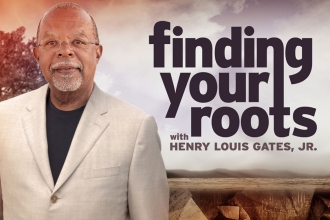
Finding Your Roots recently wrapped its 10th season
How Finding Your Roots Turns DNA Research Into Essential TV
Producers behind PBS' series reveal how they help guests explore their family trees.
There's one line even celebrities can't hop: Getting selected as a guest for PBS's popular series Finding Your Roots with Dr. Henry Louis Gates, Jr.
But this year, three non-celebrities — selected from over 9,000 applicants — get the VIP treatment as the show caps its 10th season on April 9 with their family histories. Famous or not, everyone appearing on the show, which averages 21 guests per season, needs a compelling family story. And the producers prefer that story to involve, or center on, a situation or historic period that Finding Your Roots hasn't already covered.
They also must be available for a five-hour, on-camera interview with Dr. Gates within the season's 10-month production window. "Ideally, between the folks on the waitlist and the outreach we do in real time — depending on what's happening in the pop-culture zeitgeist — about three months before we start a new season we already have a 15-person guest list," explains series producer Natalia Warchol. She is part of a core team of three producers, three associate producers and three researchers who oversee the series. Potential guests must also complete questionnaires that cover basic family information and take multiple DNA tests. "We also ask questions like: 'Do you have any family history stories that you've heard that maybe you want us to explore? What do you know? What don't you know that maybe you want to know?'" says lead genealogist and associate genetic genealogist Kimberly N. Morgan. "Sometimes guests know quite a bit, and sometimes they don't really know anything."
Genealogists cull that information in their process to research and build family trees for each guest. DNA results help ensure the accuracy of the paper trails. "Over 45 million people have taken direct consumer DNA tests. That means that when someone's DNA is added to that database — like our guests' are — if there's a mystery in there, we're very likely going to uncover it," says CeCe Moore, the show's lead genetic genealogist, who uses DNA to solve or dispel mysteries lurking in family trees. The more compelling their family stories, the more likely a celebrity will be featured. "You have to have certain components to tell a story on TV — a beginning, middle and end — and you have to have documents," Morgan says. "So, we keep an eye out while we're doing the research. If something seems really interesting, we'll mention it to the production team. It's ultimately their decision as to which stories they pursue."
If records show a guest's ancestor lived in an area struck by a natural disaster, war or similar catastrophic event, researchers will dig deeper to see how — and if — that person was affected. "It starts very broadly, on the macro level, then you zero in," Warchol says. "Most of the people on our production have been on the show for so long that they're attuned to the history of different parts of the world and the country. It's like you get a Ph. D in history and genealogy by working on this show."
Ask Warchol, Moore and Morgan which guest from the show's first 10 seasons proved especially fascinating, and the immediate and overwhelming response is: Joe Manganiello.
"Because of genetic genealogy, we found some answers to questions that he and his family were long seeking," Moore says. "The unexpected surprises led to the richest family history I think I've ever seen for anyone. We've had so many incredible guests, so many amazing discoveries that, normally, I'd say it's impossible to choose just one. But I think his [story] wins." Moore is thrilled that the True Blood actor has continued pursuing his family history since appearing on the show.
One family history that proved especially challenging was that of Reservation Dogs actor Wes Studi. "He came to us saying, 'I don't know who my biological father is,'" Morgan recalls. "I knew he was Cherokee, and I'd wanted to do a Native American Indigenous person for a long time. But once I actually got into the research, I thought I'd bitten off more than I could chew."
Through DNA, Morgan and her team discovered two brothers — either of whom could be Studi's father — but Roots could not specifically determine which man was his father and which was his uncle. Studi's Indigenous roots also gave the show a chance to delve into the history surrounding the Trail of Tears.
The same process for selecting celebrity guests was applied to the civilian candidates. "Once we got it narrowed down," Morgan explains, "Natalia and the production team surprised us and said: 'Instead of doing just one, how about we do all three finalists?'"
Finding Your Roots' waitlist keeps growing because people are fascinated by how the past shapes our future. "One of the reasons we're so fortunate to get so many great guests is they have those same questions that all of us have: 'Who am I? How did I become who I am? What is my place in the world?' That's what makes it universal," Moore says. "Thousands of people have gone on to answer their own identity questions because of this series. That is incredibly meaningful to us."
Finding Your Roots airs on PBS.





